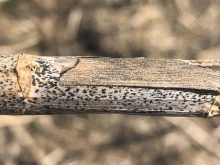University of Alberta researchers say new strains of clubroot have been discovered in fields across the Prairies, including several capable of infecting canola plants bred to resist the disease.
They identified 25 unique clubroot pathotypes from samples collected from more than 250 fields in Alberta, Saskatchewan and Manitoba in 2019 and 2020. Seven of the strains are new, six of which can bypass the crop’s bred resistance against the disease.
“The findings really underscore how quickly pathotype shifts are occurring and how quickly we are finding new pathotypes. And it is likely we will continue to find new ones,” study lead Keisha Hollman, a PhD candidate in plant science, said in a U of A release.
Read Also

Innovation takes centre stage at record-breaking Ag Expo
Lethbridge event hits capacity with 326 global exhibitors showcasing the latest ag tech, innovation and the 129th North American Seed Fair.
Clubroot is caused by a parasite that infests field soil with resting spores that can survive up to 20 years.
The release said most of the pathotypes were found in only a handful of fields, but the dis- ease’s ability to continue to emerge poses a challenge for canola producers. It can take up to a decade to develop a clubroot-resistant plant.
Hollman said producers must continue to manage the risk through integrated management strategies that help take the pressure off genetic resistance alone. Those measures include sanitizing farm equipment between fields and rotating out of canola for at least two years — a strategy found in a 2019 U of A study to reduce the number of clubroot spores by about 90 per cent in field soil.















